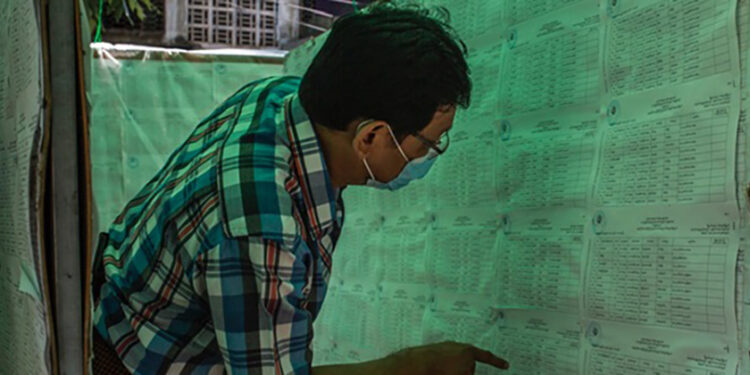Over the past few months, Myanmar’s electoral body, the Union Election Commission (UEC), has been under fire for its voter lists errors, early voting of nationals overseas and censorship of political parties’ speeches on the state media.
The latest criticism is of its decision to cancel voting in areas dominated by ethnic minorities.
The UEC cited security as justification to cancel voting in 15 whole townships and parts of 41 townships in six ethnic-minority areas. However, it has failed to explain why it gave the green light for voting in Chin State’s Paletwa Township, a flashpoint between government troops and the Arakan Army. The UEC also claimed some village tracts were excluded because they no longer existed or the authorities were unable to compile voter lists, including townships under the control of Kachin, Karen, Wa and Mong La armed groups.
UEC spokesman U Myint Naing last Wednesday said the body will reconsider voting in some parts of Paletwa where fighting is ongoing but the decision is still pending.
The UEC’s voting cancelation has denied the right to vote to an estimated 1.5 million of Myanmar’s 38 million voters. The UEC said it took recommendations from the general administration department (GAD) under the Union Government Office, electoral sub-commissions and the military’s security staff.
It turned out that the UEC based most of its decisions on the military’s recommendations, especially in nine Rakhine State townships and Shan State’s Mong Kung Township, because the GAD did not recommend that all those townships should not hold voting.
In response, the government and military held weekend press conferences in which voting cancelation was covered.
The military’s spokesman, Major General Zaw Min Tun, said on Saturday that the armed forces recommended that 39 townships, including Paletwa, were too unsafe to hold the election.
“The UEC made an unfair decision about Paletwa and Mong Kung with the latter should be postponed and the former could hold the election,” said U Ye Tun, a political observer and former Lower House parliamentarian for Shan State.
Ethnic parties have allied or merged to win more seats while a few new parties now rival the National League for Democracy (NLD).
Therefore, the UEC’s move to cancel voting in ethnic-party strongholds leaves questions about the body’s impartiality and undermines public trust.
On Nov. 8, Myanmar has voting taking place in 1,119 out of 1,171 constituencies, excluding the 25 percent of seats reserved for the military, across the Union and state and regional parliaments. More than 5,800 candidates from 91 parties and independents will take part. The NLD is fielding the highest number of candidates, followed by the military-proxy Union Solidarity and Development Party.
In the 2015 election, the NLD won a landslide, taking 75 percent of 1,150 contested seats, where 6,038 candidates from 91 parties and independent candidates competed.
Thousands of nationals in other countries have also lost their right to vote because of UEC incompetence.
According to the Ministry of Foreign Affairs, from July 16 to Aug. 16, 109,470 migrants registered for early voting. The UEC approved 101,526 of them and their ballots papers were sent to various diplomatic missions in late September.
Many of the 8,000 nationals whose early-voting forms were not approved by the UEC for overseas voting reportedly because of logistical errors as the applications were not sent to township electoral sub-commissions for approval.
The ministry said on Sunday that more than 70,000 of the 101,526 eligible voters overseas cast ballots in the three weeks after Oct.1 at 45 embassies and consulates.
Voter lists inaccuracies also irked the public. Corrections were made during the second voter-list display this month. Those were reportedly due to technical and human errors. The UEC had more than four years to prepare but compiling voter lists only began last year.
The UEC’s censorship of party speeches is another source of dissatisfaction. The UEC spokesman said the body scrutinized if the speeches complied with regulations and at least four parties canceled their broadcasts after words were cut.
The Carter Center, the international election agency established by former US president Jimmy Carter which will observe Myanmar’s general election, said on Oct. 13 that the UEC’s “handling of these issues, as well as structural legal shortcomings, continue to undermine the democratic character of Myanmar’s elections”.
However, political campaigning continues and the UEC keeps pushing the electoral process forward amid the criticism.
Myanmar will choose its next government on Nov. 8, amid the COVID-19 pandemic. The UEC promises to ensure the health and safety of all voters and that the election will be free and fair. However, it remains to be seen if that UEC will prove itself capable of handling a free and fair election.
You may also like these stories:
‘The People Will Decide if Myanmar’s Election Is Free and Fair’
Court Verdict Looms for Disgraced Party Leader in Myanmar

















